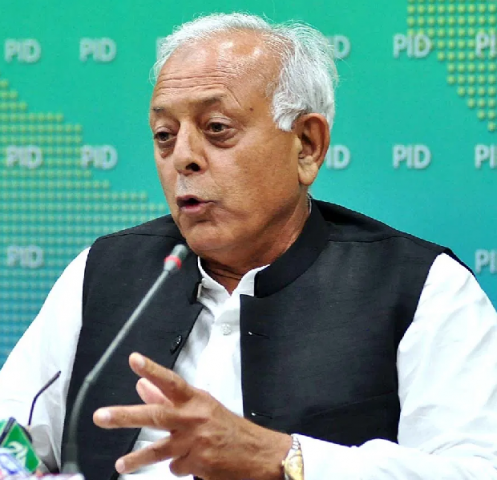Ministers dissatisfied with govt’s agricultural policies
Ghulam Sarwar, Fehmida Mirza tell NA panel no relief given to farmers by PTI govt so far

Several ruling PTI federal ministers criticised their own government for failing to provide any relief to the agriculture sector.
During a meeting of the National Assembly’s Special Committee on Agriculture, federal ministers Ghulam Sarwar Khan and Fehmida Mirza pointed out high prices of agricultural inputs and low rate of the output.
Expressing his dissatisfaction with the government’s policies, Khan, the aviation minister said that the lasttwo and a half to years “we have not been able to do anything for the agricultural sector. Mirza, the inter provincial coordination minister said that no relief had been given to growers.
However, Finance Minister Hammad Azhar and Food Security Minister Fakhar Imam defended the government policies. Azhar said that the price of DAP fertiliser had been increased because of the hike in international price, adding that increasing support price of wheat would affect the flour price.
The meeting was chaired by National Assembly Speaker Asad Qaiser, which was also attended by Usman Dar, Shandana Gulzar and others. Gulzar informed the committee that the government would initiate ‘Kamyab Kisan’ programme.
“The Kamyab Kisan programme will be implemented in 15 to 20 districts as a pilot programme under which loans will be provided at 5% interest rate,” she said. The growers will also be provided training in new technologies,” she added.
Dar explained that Rs2 billion had been disbursed in the agriculture sector under the Kamyab Jawan programme. “The Kamyab Jawan programme has two components, including training in the agricultural sector,” he added.
Dr Fehmida Mirza said that the government was doing a good job in the agricultural sector but “nothing is visible on the ground”, adding: “We all know where 90% of agricultural development loans go.”
Committee member Sanaullah Khan Mastikhel stressed the need for making the Zarai Taraqiati Bank farmers friendly. Farooq Azam Malik, another committee member, criticised the attitude of the officers of the agriculture department towards the lawmakers.
Ghulam Sarwar Khan unleashed a trenchant criticism of the relevant ministers on declining wheat production in the country. “I’m helpless in the cabinet. In two and a half to three years, we have not been able to do anything for the agricultural sector,” he said.
Also read: Digital transformation in agri sector
“We could not give any relief to the agricultural sector. The government gave relief to industry and services but not to agriculture. The voice of the people for sectors other than agricultural is more powerful,” he lamented.
“We are importing wheat but the government is not ready to give anything to its own growers. Imported wheat costs Rs2,400 [pre 40 kilogrammes] but we’re are giving Rs1,800 to the growers [in the shape of support price],” the minister told the committee.
Referring to a wheat support price fixed by the Sindh government, sarwar said Sindh’s decision is practical. “Last year DAP [fertiliser] was sold at Rs2,800 [per bag] but this year, the rate is Rs5,000,” the minister added. He called on the government to release funds announced for this sector.
Food Security Minister Fakhr Imam told the committee that the price of wheat was increased on December 16, 2019 but at that time, the Sindh did not procure the commodity. He added that the hoarding was also a big problem.
However, he added that wheat production this year would be 1 million ton more than the output last year. “We had moved a summary for cotton support price but it was not considered. We had proposed for the purchase of 400,000 bales of cotton but it was also not considered.”
Finance Minister Azhar said that the Prime Minister was giving great importance to the agriculture. He assured his ministry’s full support to the Agriculture Committee. “When we came to power, the support price of wheat was increased. The sale of urea had also risen after about 10 years, he added.
Explaining the increase in the DAP prices, the minister said that 70-80% of the fertiliser is imported in the country, therefore, the price hike was linked to its international rate. Defending the wheat support price, he said, increasing the price would impact the flour price.
On the wheat import, the minister explained that the price of imported wheat includes shipment, loading and other expenses. On the Sindh government’s rate, the minister said that the provincial government fixed the support price at Rs2,000 but it had to procure only 1 million tons.
Speaker Asad Qaiser directed that the difficulties facing the farmers relating to the Zarai Taraqiati bank should be addressed. He also directed that the wheat issue should be discussed in a subcommittee meeting.
Talking to the media persons after the meeting, Qaiser said that problems occure because of the climate change. Responding to a question, Qaiser said that the stance of Ghulam Sarwar in the meeting was his personal viewpoint.



















COMMENTS
Comments are moderated and generally will be posted if they are on-topic and not abusive.
For more information, please see our Comments FAQ